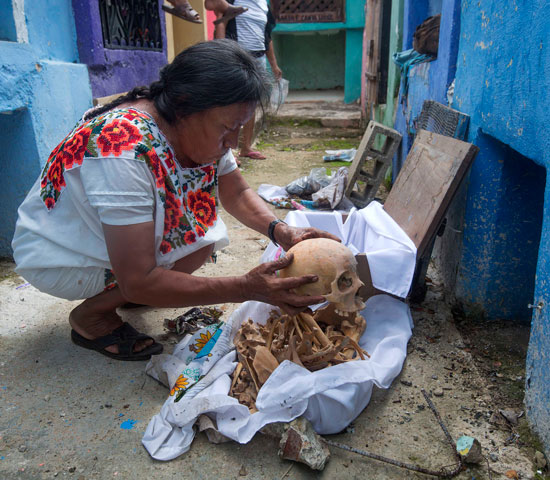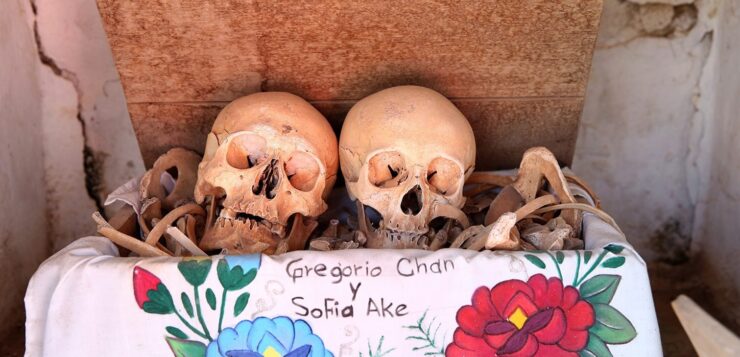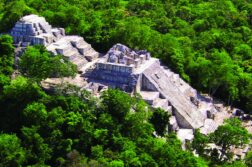There are many things that make México different from its North American neighbors, due not only to the violent colonization by the Spanish, but also the many indigenous groups in what is now called Los Estados Unidos Mexicanos. One of these things is the relationship with, and feelings about, death.
In México, death is embraced as part of, well, life. Día de Muertos, or Day of the Dead, is a true cultural event in the country, but the Yucatán Peninsula has its own beliefs and traditions that make it unique among other celebrations.
Here, we call it Hanal Pixán, or feast of the spirits, and celebrate it with altars and the favorite food and drinks of the departed loved ones, as well as flowers and candles. Cemeteries all over the Peninsula come to life (so to speak) with plenty of activity as the living prepare for the return of the dead, repairing and painting tombstones and mausoleums, and placing votive candles alongside fresh as well as plastic flowers to brighten the scene.
This article, however, is not about these festivities, but rather about some regularly occurring and quite interesting funerary traditions that are prevalent in some parts of the Yucatán Peninsula, namely in the northern part of what is now the state of Campeche.

In a few towns in this region, there are very special rituals dealing with the treatment of dead relatives. Be warned that these unique traditions would be considered strange by those of us accustomed to more “modern” and less intrusive or hands-on methods of dealing with our deceased loved ones. According to researchers, however, these rituals date back to ancient times and were observed by and written about by the infamous friar Diego de Landa (the Catholic priest that burned most of the Maya’s written records in Maní) among others.
While there are similarities in funeral traditions among towns like Calkiní, Tenabo, Dzitbalché, and Hecelchakán, the one that comes up most often is the relatively small village of Pomuch. Side note: Pomuch is also famous for its bread, the aptly and very originally termed Pan de Pomuch, which makes the stop a must for many who find themselves traveling the Mérida-Campeche road.
What makes Pomuch and these other towns unique is their ceremonious and respectful treatment of the human remains of their loved ones. It may be shocking for foreigners to learn that the bodies of the dead, after resting comfortably in their coffins for 3 to 5 years, are exhumed, hopefully having decomposed to the point that what is left is only bones. The length of time that it takes for this decomposition to happen depends on the ground, the moisture, the type of coffin (metal or wood), and even medications taken by the deceased.

Once removed from the original burial site, the bones are carefully cleaned. This is done by the Sepulturero (gravedigger), whose job it is to not only supervise the correct removal of the body from the ground, but also to take each bone and individually clean it, removing every last trace of flesh and placing the clean, white bones in a smaller box. It is important to ensure that all the bones are included, from the smallest vertebrae to the tiniest bones in fingers and feet.
In many towns, these bones, once removed from their coffins, are wrapped in cloth and set out to dry in the sun and the warm Campeche air. What makes Pomuch unique, and I believe this is what people talk about, is that the bones here are not wrapped, and so are out for all to see. It can be disconcerting, I suppose, to see a collection of bones, large and small, carefully placed in a wooden, metal, or cardboard box, complete with a human skull on top. If the deceased person’s hair survived the time underground, it is carefully placed on the cranium to complete the rather macabre (to our Western eyes) scene.

There is a strong tie between the living and the dead; the departed are very much present and have not actually left just yet. The spirit of a good person must make its way from purgatory to heaven, and for this to happen, the relatives must pray; and pray they do. Children skip purgatory and go straight to heaven, as it is thought they have no malice and no sins to explain away or atone for. Those who committed suicide (squandering the life given to them by God) and other sinners go straight to hell.

Death is very much an accepted reality of our time on this earth, and the treatment of the remains of those who have gone before us is considered not only necessary but completely natural and normal. Perhaps if we set aside our preconceived notions of what is the “right” way to venerate those who have gone before us, and continued to consider them part of our family in a loving way, we might develop a healthier relationship with the dead that would eliminate the “death is frightening” concept we tend to have.
At the moment, at least on a very recent visit, the cemetery in Pomuch remains locked up and not open to the public, as part of the state’s measures to combat the spread of the COVID-19 virus. Once it reopens, and you are interested in the subject, I highly recommend stopping there as part of a day trip to the area. Perhaps you too will be able to witness the cleaning of the bones or at least catch a glimpse of them drying in the sun.
Editorial by Ralf Hollmann
A Yucatecan born in Germany and raised in Canada, with a degree in Hospitality and Tourism from the British Columbia Institute of Technology. Ralf has experience in leisure tourism, journalism, research, editing, writing, and creative writing. He’s also a musician.
Source: Yucatan Today





